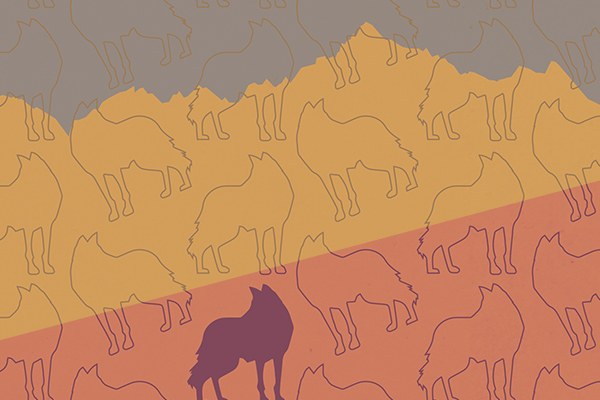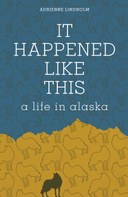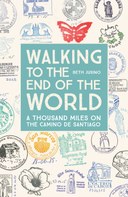
Following is an excerpt from It Happened Like This: A Life in Alaska, by Adrienne Lindholm. Adrienne's memoir recounts her two decades in Alaska, arriving as a young woman raised on the East Coast, and finding her way in the 49th state, where she has worked for the National Park Service for more than 16 years. It Happened Like This is published by Mountaineers Books.
When You Go Into the Country
“Do you think you’ll stay in Alaska?” I asked.
“To tell you the truth, these trips and our friends are amazing, but I haven’t found a job that’s right for me. Maybe I should go back to school. And you know, I miss being close to my family in Seattle. We’ll see. How do your parents feel about you wanting to stay here?”
I rolled onto my back and pinched a mosquito against the tent wall. “I think they’ve accepted that we’re all going to have to travel a lot to see each other.” I wondered what they were doing that week. I knew Mom would be busy with her environmental group and local politics, but since Dad had retired he hadn’t found anything that delighted him as much as being with my brother and me. I wished I had made more of an effort to talk with them.
“Hey, Shell, have you ever made a list of goals for the year?” I asked. We talked about everything we would put on that list: calling our parents more often, researching options for going back to school, dedicating time each week to practice art, taking a ballet class, entering a mountain bike race, organizing a community talent show, volunteering to do trail work.
“To be our best selves,” I said, “maybe the greatest thing we can do is cultivate the sense of openness that we feel out here.” I began to recall with shame how I’d judged some of my Lower 48 friends for taking corporate jobs and allowing themselves to be tied down with kids so early in life. I had been hard on myself too. I questioned my adamant belief that it was a sign of strength to depend only on myself. What would it feel like to be more honest with myself, to really listen? Instead of doing what I thought I should be doing to appear strong, what if I chose a path that included self-care and honest reflection? I remembered meeting Page and observing how she confidently aligned her life with her values, and I recalled how I’d dismissed that as lucky. But after long slow days in the wilderness with Shelley, I started to think a balanced life was possible.
Before I fell asleep I began to catalog other things I felt adamant about. The first thing that came to mind was hunting. I remembered the look of disdain in my mom’s eyes when her brother moved to Idaho and went hunting every chance he got. “Poor animals,” she said. “Just awful.” And I agreed. When I thought of hunting, I thought of pick-up trucks loaded with beer and ammunition, camo-clad men driving dirt roads looking for something to shoot at, maybe only to get the antlers. Dad shook his head too: “No sport in it at all.”
Over the last few months, though, I’d gotten a chance to talk with locals from rural Alaskan communities, and I had to admit the way they hunted moose and caribou seemed different from every preconceived notion I’d had about hunting. I fell asleep feeling the world was not as black and white as I’d thought.
As the days passed, Shelley and I covered miles and closed in on the coastal plain of the Arctic Refuge. For a wilderness lover like myself this was sacred ground, the nation’s symbolic battlefield of oil development versus wilderness, the fabled calving grounds of the Porcupine Caribou Herd. As we descended a tundra slope above the plain we were engulfed by thick mist and decided to stop and make camp. The night was cold, and it rained hard. The corner of the tent leaked onto the foot of my sleeping bag. I shivered in the morning, had to work hard to warm my toes, and carefully plotted how to change my clothes without letting heat escape. I anticipated the flavor of almonds and dried mangos I would eat for breakfast.
Seeing the sky clear after a night of rain made me happier than I’d felt in a long time. Watching a golden eagle dive for a fish while we ate breakfast made me think that I ought to thank someone—it was such a fantastic gift. Later, running down the mountain made me feel like a kid, yelping and leaping and not worrying about anything. I saw what it meant to live in the present, to live for at least a day using all of my senses, to feel connected to something greater. All the things that seemed to matter at home, all the things by which I allowed myself to be defined—how well I did at work, how quickly I could climb a mountain, how well I fit in among my friends and Alaskan community—did not seem like the most important things anymore.
After nearly two weeks of backpacking and boating with Shelley, it had become difficult to talk about my job or my to-do list at home. They seemed so irrelevant. I was not my job, after all, nor was I my athletic ability or my imperfect body. I was not the accolades I’d received at work, and I was not the rejection I’d felt when the mountain runner guy that I liked started dating someone else. That wild place, the Arctic National Wildlife Refuge, showed me this, and I suppose that’s why I had come. I relished this fresh perspective until the day before we were scheduled to meet the pilot who would fly us back to civilization.
By then my dwindling bag of trail mix was mostly peanuts. Otherwise we had one emergency dinner of pasta, a few dried banana chips gone soggy, and an energy bar. My two shirts stank and my down jacket was damp from the rain. My socks and shoes were permanently saturated. My hair was greasy and matted to my forehead.
Maybe I wouldn’t mind a nice dinner out. Maybe a hot shower would feel good. I knew once those thoughts started, the trip would be over. But lousy weather could not be kept at bay. The plane might not be able to fly. The pilot might not come for another day or two or three.
We waited.
Our pile of gear was a bit smaller because our food was nearly gone. Shelley made a thermos of tea and sat on her pile of gear.
“What’s the longest you’ve waited?” she asked.
“Three days, when we were fogged in on the coast.”
I searched the sky. “Is that it?” I said, thinking I might have heard a far-off plane engine.
Shelley squinted, shook her head, and returned to where she’d left off in the book she was reading.
Some of the anxiety that I’d let go of began to creep back in. I beseeched myself to hold the feeling of spaciousness, but my mind was a trickster bent on convincing me of the importance of the work that had piled up in my office while I was gone, the looming social engagements, the car payment that was overdue. I sat beside Shelley and toggled between the wild and encumbered versions of myself. After an hour of silence, Shelley perked up. “Do you hear that? Is that it?”
I strained but couldn’t hear anything. It was nothing again. I wondered how long it would be. I wondered if we should pitch the tent. Near the end of the day I begged the plane to come. It was all I thought about.
“Ah!” I yelled finally. “That’s it!” We both heard the engine. We scanned the sky. The plane angled in and touched down. Knowing that the adventure was now over, I felt sad for an instant. I glanced around one last time.
The pilot hopped out to load our backpacks, and I struggled to think of something to say. “Oh, thanks,” I mumbled as I dragged my gear to the plane. It was just so weird that someone had dropped out of the sky into our realm.
I waited for him to strap our packs down and tried to reconcile my conflicting desires to stay and leave. Thriving in the wild had transformed me. I had become a new version of myself and had shed, however slightly and temporarily, the burden of modern convenience and the burden of my critical thoughts.
Lured by the promise of a shower and good food, I stepped toward the plane. Shelley gave the pilot her bright smile and climbed in the front seat. We easily lifted into the sky. Behind her, I smiled as she bantered with him the entire way home.
Excerpted from It Happened Like This: A Life in Alaska (Mountaineers Books, August 2018) by Adrienne Lindholm. To read more of Adrienne's adventures, make sure to pick up a copy of It Happened Like This, new this month!
 Mountaineers Books
Mountaineers Books

